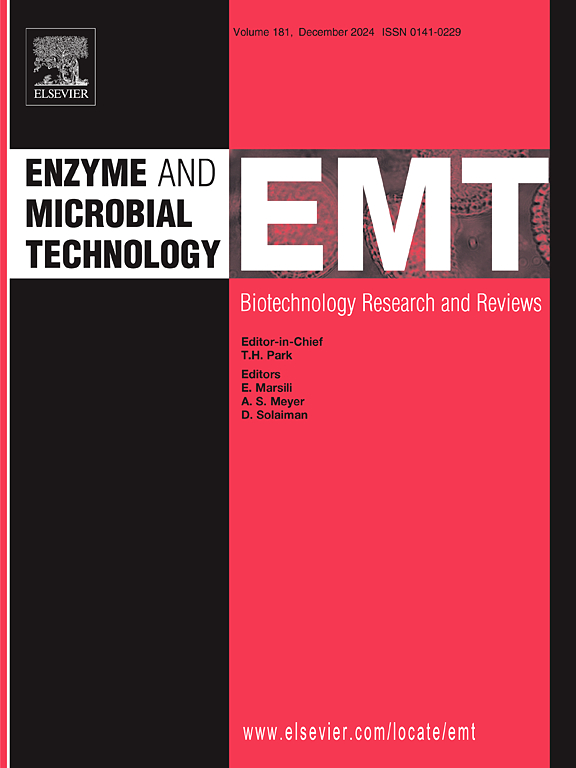Enhancing catalytic activity of thermostable 4-α-glucanotransferase from Thermus filiformis through semi-rational design
IF 3.7
3区 生物学
Q2 BIOTECHNOLOGY & APPLIED MICROBIOLOGY
引用次数: 0
Abstract
4-α-glucanotransferases (4GT) are valuable enzymatic tools with application in the food and pharmaceutical industries, particularly for producing thermoreversible starch gels. The screening of thermostable 4GT enzymes with high catalytic activity presents a significant challenge. In this study, a comprehensive screening of potential 4GT in the UniProt database led to the identification of a 4GT from Thermus filiformis (TfGT) with superior catalytic activity and thermal stability. To further improve its catalytic efficiency, a semi-rational design approach based on protein sequence conservation analysis was employed. The optimized mutant, M3 (Q60S/Y452I/R455K), exhibited a 3.76-fold increase in specific activity compared to the wild type (WT) enzyme and retained more than 50 % of its activity after incubation at 70 ℃ for 24 h. Additionally, molecular dynamics simulations revealed that the enhanced activity of M3 was largely due to the reshaping of the substrate tunnel, which facilitated substrate entry to the active pocket and promoted the reaction. This study not only provides a robust approach for enhancing 4GT enzyme performance but also paves the way for broader industrial applications of 4GT enzymes.
通过半合理设计提高丝状嗜热菌恒温 4-α 葡聚糖转移酶的催化活性
4-α-葡聚糖转移酶(4GT)是一种有价值的酶工具,在食品和制药工业中有着广泛的应用,特别是在生产热可逆淀粉凝胶方面。筛选具有高催化活性的耐热4GT酶是一个重大挑战。在这项研究中,通过对UniProt数据库中潜在4GT的综合筛选,鉴定出了一种具有优异催化活性和热稳定性的来自丝光热藓(Thermus filiformis)的4GT。为了进一步提高其催化效率,采用了基于蛋白质序列保守分析的半理性设计方法。优化后的突变体M3 (Q60S/Y452I/R455K)比野生型(WT)酶的比活性提高了3.76倍,在70 ℃孵育24 h后,其活性仍保持在50% 以上。此外,分子动力学模拟表明,M3活性的增强主要是由于底物隧道的重塑,使底物更容易进入活性袋,从而促进了反应。该研究不仅为提高4GT酶的性能提供了可靠的方法,而且为4GT酶的更广泛的工业应用铺平了道路。
本文章由计算机程序翻译,如有差异,请以英文原文为准。
求助全文
约1分钟内获得全文
求助全文
来源期刊

Enzyme and Microbial Technology
生物-生物工程与应用微生物
CiteScore
7.60
自引率
5.90%
发文量
142
审稿时长
38 days
期刊介绍:
Enzyme and Microbial Technology is an international, peer-reviewed journal publishing original research and reviews, of biotechnological significance and novelty, on basic and applied aspects of the science and technology of processes involving the use of enzymes, micro-organisms, animal cells and plant cells.
We especially encourage submissions on:
Biocatalysis and the use of Directed Evolution in Synthetic Biology and Biotechnology
Biotechnological Production of New Bioactive Molecules, Biomaterials, Biopharmaceuticals, and Biofuels
New Imaging Techniques and Biosensors, especially as applicable to Healthcare and Systems Biology
New Biotechnological Approaches in Genomics, Proteomics and Metabolomics
Metabolic Engineering, Biomolecular Engineering and Nanobiotechnology
Manuscripts which report isolation, purification, immobilization or utilization of organisms or enzymes which are already well-described in the literature are not suitable for publication in EMT, unless their primary purpose is to report significant new findings or approaches which are of broad biotechnological importance. Similarly, manuscripts which report optimization studies on well-established processes are inappropriate. EMT does not accept papers dealing with mathematical modeling unless they report significant, new experimental data.
 求助内容:
求助内容: 应助结果提醒方式:
应助结果提醒方式:


